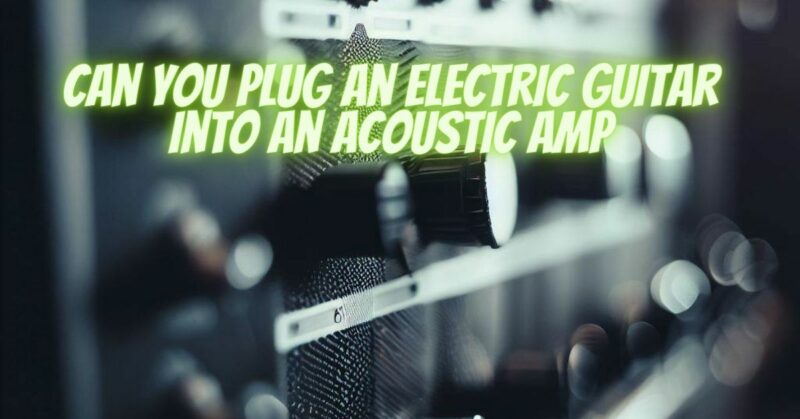The world of musical experimentation often leads musicians to consider using different equipment in unconventional ways. One such question that arises is whether it’s possible to connect an electric guitar to an acoustic amplifier. This article delves into the compatibility, challenges, and potential benefits of using an acoustic amplifier for an electric guitar setup.
Understanding Acoustic Amplifiers:
Acoustic amplifiers are designed to faithfully reproduce the natural sound of acoustic instruments, such as acoustic guitars, violins, and vocals. They typically feature a clean and transparent tone with minimal coloration.
Electric Guitar and Acoustic Amplifier Compatibility:
While it’s possible to connect an electric guitar to an acoustic amplifier, there are several considerations to keep in mind:
- Tonality:
- Acoustic amplifiers are optimized for acoustic instruments, so the tonal characteristics might not fully complement the characteristics of an electric guitar.
- Sound Coloration:
- Acoustic amplifiers tend to produce a clean, uncolored sound. This might result in an electric guitar sounding thinner or lacking the distortion and saturation typically associated with electric guitar amplifiers.
- Volume and Gain:
- Acoustic amplifiers might not have the same level of gain or power as electric guitar amplifiers, which can impact the ability to achieve the desired volume and overdrive.
Benefits of Using an Acoustic Amplifier:
- Clean Sound:
- Acoustic amplifiers are renowned for their clean and clear sound reproduction. This can be advantageous if you’re looking for a transparent and unaltered tone from your electric guitar.
- Versatility:
- If you’re a multi-instrumentalist or frequently switch between acoustic and electric instruments, using an acoustic amplifier can provide a convenient all-in-one solution.
- Effects Integration:
- Many acoustic amplifiers come with built-in effects like reverb and chorus. These effects can add depth and dimension to your electric guitar sound.
Challenges and Considerations:
- Tonal Expectations:
- If you’re accustomed to the specific tonal characteristics of electric guitar amplifiers, using an acoustic amplifier might require adjustments in expectations.
- Distortion and Overdrive:
- Achieving the desired level of distortion or overdrive might be challenging with an acoustic amplifier, which is not typically designed for high-gain applications.
- EQ and Tone Shaping:
- Acoustic amplifiers might not offer the same EQ options and tone shaping capabilities as electric guitar amplifiers.
While it’s possible to connect an electric guitar to an acoustic amplifier, the tonal characteristics and challenges associated with this setup should be considered. If you’re seeking a clean and transparent sound or require a versatile solution for both acoustic and electric instruments, using an acoustic amplifier can be an intriguing option. However, for those seeking the signature overdrive and tonal coloration of electric guitar amplifiers, it’s advisable to use dedicated electric guitar amplification. Ultimately, experimentation and personal preference play a significant role in shaping your sonic journey.


